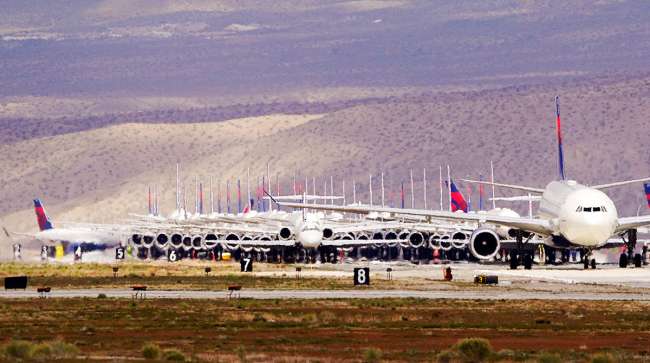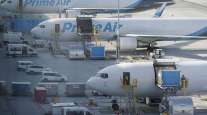Senior Reporter
Airlines Shift to Cargo as Passenger Volume Falls Dramatically

[Stay on top of transportation news: Get TTNews in your inbox.]
Faced with hundreds of parked planes and near-empty flights as a result of the coronavirus pandemic, some of the world’s biggest airline executives are turning their focus to cargo.
Delta Airlines said March 30 it’s beginning cargo-only flights between Shanghai and Detroit three times a week with Airbus A350-900 jets.
“We know getting surgical masks, gloves, gowns and other protective equipment expeditiously to facilities across the country is imperative to protecting medical professionals and helping address the COVID-19 situation,” said Shawn Cole, vice president of Delta Cargo.
Throughout last week, we sent more than 150,000 pounds of cargo — consisting almost entirely of perishable goods — to our friends in Hawaii to help meet their needs for fresh foods. pic.twitter.com/EGXP6ccnsy — American Airlines (@AmericanAir) March 29, 2020
Atlanta-based Delta has not operated regular cargo-only flights since 2009 when it was in the process of merging with Northwest Airlines. It said it’s adding the flights now as manufacturing capacity in China begins to restart, and will get the needed items to the U.S. faster than the 28 days it usually takes to move products by ocean carrier.
Delta recently announced it’s cutting its schedule by 80% and idling 600 of its jets. Dozens of them are parked side-by-side on a runway and numerous taxiways at Hartsfield-Jackson International Airport in Atlanta — the world’s busiest airport.
According to the Transportation Security Administration, passenger traffic at was down 93% at Hartsfield-Jackson checkpoints March 29 compared with a year ago.
Southwest Airlines, based in Dallas, said March 31 it will offer cargo-only flights for the first time in its nearly 50-year history.
When @RocheDia needed to ship a vital component of a COVID-19 testing unit from New Jersey to Florida, United Cargo jumped in to help.
Read about how this part will allow @MayoClinic to process hundreds of tests per day for cases in the Southeastern U.S. https://t.co/Br16XPhGHI pic.twitter.com/yyka2I8jxC — United Airlines (@united) March 31, 2020
“For many of our cargo customers, time is of the essence as we often carry life-critical medical treatments, medical supplies and even food products,” the company said. “Now, as the United States faces the brunt of the COVID-19 crisis head-on, we’re looking for ways to continue getting these much-needed products to those who need it the most.”
Additionally, the company said it carries many goods purchased online.
Specific routes have not yet been announced, and only Southwest employees will be allowed on cargo-only flights. The airline also recently announced it was cutting its flying capacity by more than 40%.
United Airlines on March 28 announced some of its parked wide-body aircraft would be used as charter cargo flights to transfer critical products battling the coronavirus around the U.S. and to “key international business locations,” primarily in Europe.
The Chicago-based carrier said flights are operating out of U.S. international airports, including Chicago O’Hare, Liberty Newark, George Bush Intercontinental in Houston and San Francisco International.
“Right now, aircraft flying the United livery and insignia, flown by our aviation professionals, have been repurposed to deliver vital medical supplies and goods to some of the places that need it most,” said CEO Oscar Munoz in an email to employees.
Fort Worth, Texas-based American Airlines announced March 20 it was flying its first scheduled cargo-only flight since 1984. The airline is running two round-trip flights over four days between Dallas-Fort Worth International Airport and Frankfurt, Germany. The Boeing 777-300s can carry more than 100,000 pounds of cargo.
“We have a critical role to play in keeping essential goods moving during this unprecedented time, and we are proud to do our part and find ways to continue to serve our customers and our communities,” said Rick Elieson, president of the cargo division. “Challenging times call for creative solutions, and a team of people across the airline has been working nonstop to arrange cargo-only flight options for our customers.”
Meanwhile, FedEx Corp., the package carrier that routinely ferries cargo abroad, said March 31 it is enacting a temporary surcharge on all international parcel and freight shipments on FedEx Express and TNT Express due to the pandemic.
The surcharge, ranging between 5 cents and $1 per pound, is effective April 6, according to the Memphis, Tenn.-based company.
“FedEx and TNT continue to operate as essential businesses, keeping commerce moving and delivering critical relief under state of emergency and shelter-in-place restrictions issued in various parts of the world,” the company said.
CEO Fred Smith said recently its pilots and crew flew 246 flights in and out of China as that nation begins to restart its manufacturing base after residents there became ill with the coronavirus.
FedEx ranks No. 2 on the Transport Topics Top 100 list of the largest for-hire carriers in North America and No. 15 on the TT Top 50 list of the largest logistics companies.
Want more news? Listen to today's daily briefing:




